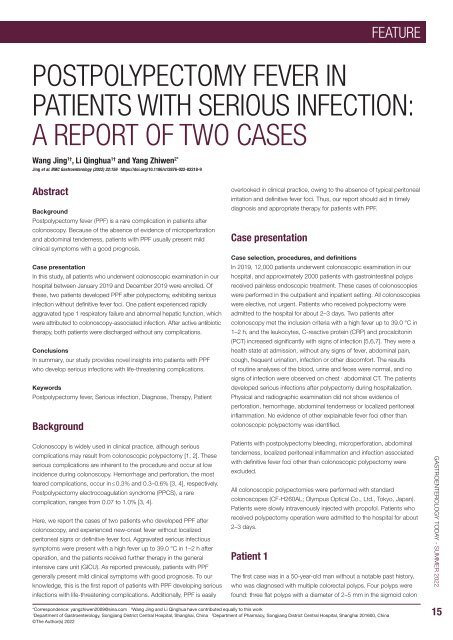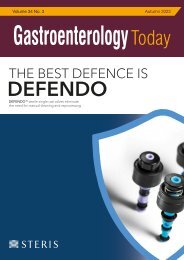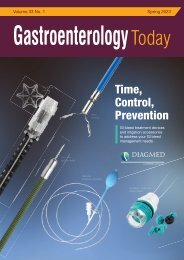Gastroenterology Today Summer 2022
Gastroenterology Today Summer 2022
Gastroenterology Today Summer 2022
You also want an ePaper? Increase the reach of your titles
YUMPU automatically turns print PDFs into web optimized ePapers that Google loves.
FEATURE<br />
POSTPOLYPECTOMY FEVER IN<br />
PATIENTS WITH SERIOUS INFECTION:<br />
A REPORT OF TWO CASES<br />
Wang Jing 1† , Li Qinghua 1† and Yang Zhiwen 2*<br />
Jing et al. BMC <strong>Gastroenterology</strong> (<strong>2022</strong>) 22:156 https://doi.org/10.1186/s12876-022-02218-9<br />
Abstract<br />
Background<br />
Postpolypectomy fever (PPF) is a rare complication in patients after<br />
colonoscopy. Because of the absence of evidence of microperforation<br />
and abdominal tenderness, patients with PPF usually present mild<br />
clinical symptoms with a good prognosis.<br />
Case presentation<br />
In this study, all patients who underwent colonoscopic examination in our<br />
hospital between January 2019 and December 2019 were enrolled. Of<br />
these, two patients developed PPF after polypectomy, exhibiting serious<br />
infection without definitive fever foci. One patient experienced rapidly<br />
aggravated type 1 respiratory failure and abnormal hepatic function, which<br />
were attributed to colonoscopy-associated infection. After active antibiotic<br />
therapy, both patients were discharged without any complications.<br />
Conclusions<br />
In summary, our study provides novel insights into patients with PPF<br />
who develop serious infections with life-threatening complications.<br />
Keywords<br />
Postpolypectomy fever, Serious infection, Diagnose, Therapy, Patient<br />
Background<br />
overlooked in clinical practice, owing to the absence of typical peritoneal<br />
irritation and definitive fever foci. Thus, our report should aid in timely<br />
diagnosis and appropriate therapy for patients with PPF.<br />
Case presentation<br />
Case selection, procedures, and definitions<br />
In 2019, 12,000 patients underwent colonoscopic examination in our<br />
hospital, and approximately 2000 patients with gastrointestinal polyps<br />
received painless endoscopic treatment. These cases of colonoscopies<br />
were performed in the outpatient and inpatient setting. All colonoscopies<br />
were elective, not urgent. Patients who received polypectomy were<br />
admitted to the hospital for about 2–3 days. Two patients after<br />
colonoscopy met the inclusion criteria with a high fever up to 39.0 °C in<br />
1–2 h, and the leukocytes, C-reactive protein (CRP) and procalcitonin<br />
(PCT) increased significantly with signs of infection [5,6,7]. They were a<br />
health state at admission, without any signs of fever, abdominal pain,<br />
cough, frequent urination, infection or other discomfort. The results<br />
of routine analyses of the blood, urine and feces were normal, and no<br />
signs of infection were observed on chest ` abdominal CT. The patients<br />
developed serious infections after polypectomy during hospitalization.<br />
Physical and radiographic examination did not show evidence of<br />
perforation, hemorrhage, abdominal tenderness or localized peritoneal<br />
inflammation. No evidence of other explainable fever foci other than<br />
colonoscopic polypectomy was identified.<br />
Colonoscopy is widely used in clinical practice, although serious<br />
complications may result from colonoscopic polypectomy [1, 2]. These<br />
serious complications are inherent to the procedure and occur at low<br />
incidence during colonoscopy. Hemorrhage and perforation, the most<br />
feared complications, occur in ≤ 0.3% and 0.3–0.6% [3, 4], respectively.<br />
Postpolypectomy electrocoagulation syndrome (PPCS), a rare<br />
complication, ranges from 0.07 to 1.0% [3, 4].<br />
Here, we report the cases of two patients who developed PPF after<br />
colonoscopy, and experienced new-onset fever without localized<br />
peritoneal signs or definitive fever foci. Aggravated serious infectious<br />
symptoms were present with a high fever up to 39.0 °C in 1–2 h after<br />
operation, and the patients received further therapy in the general<br />
intensive care unit (GICU). As reported previously, patients with PPF<br />
generally present mild clinical symptoms with good prognosis. To our<br />
knowledge, this is the first report of patients with PPF developing serious<br />
infections with life-threatening complications. Additionally, PPF is easily<br />
Patients with postpolypectomy bleeding, microperforation, abdominal<br />
tenderness, localized peritoneal inflammation and infection associated<br />
with definitive fever foci other than colonoscopic polypectomy were<br />
excluded.<br />
All colonoscopic polypectomies were performed with standard<br />
colonoscopes (CF-H260AL; Olympus Optical Co., Ltd., Tokyo, Japan).<br />
Patients were slowly intravenously injected with propofol. Patients who<br />
received polypectomy operation were admitted to the hospital for about<br />
2–3 days.<br />
Patient 1<br />
The first case was in a 50-year-old man without a notable past history,<br />
who was diagnosed with multiple colorectal polyps. Four polyps were<br />
found: three flat polyps with a diameter of 2–5 mm in the sigmoid colon<br />
GASTROENTEROLOGY TODAY - SUMMER <strong>2022</strong><br />
*Correspondence: yangzhiwen2009@sina.com † Wang Jing and Li Qinghua have contributed equally to this work<br />
1<br />
Department of <strong>Gastroenterology</strong>, Songjiang District Central Hospital, Shanghai, China 2 Department of Pharmacy, Songjiang District Central Hospital, Shanghai 201600, China<br />
©The Author(s) <strong>2022</strong><br />
15

















